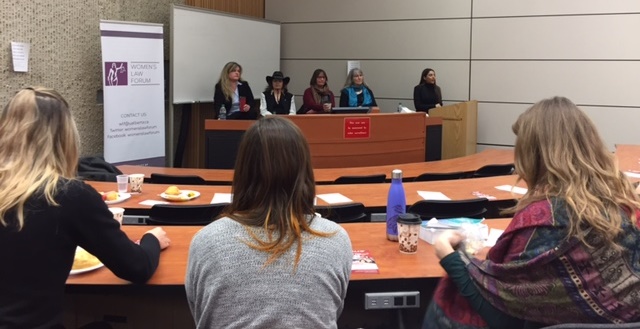
Staff burnout, wage inequality, trauma, and allyship-these are but a few of the themes covered in the final installment of the Women's Law Forum's Glass Ceilings speaker series.
The three-part series concluded on January 20 with a four-person panel discussing the role lawyers have to play in empowering women on the margins of society. The panel featured civil rights lawyer and UAlberta Law alumna Sarah Eadie, Kindred House Executive Director Shawna Hohendroff, Centre to End All Sexual Exploitation (CEASE) Executive Director Kate Quinn, and Muriel Stanley Venne, president and founder of the Institute for the Advancement of Aboriginal Women (IAAF).
The four speakers talked about how attitudes towards women and resources for people on the margins has changed considerably over the past two decades; how better understanding of trauma is helping non-profit workers better serve their clients, and helping lawyers fight for justice for those clients; as well as the challenges that remain.
Eadie was quick to address the stigma that continues to plague non-profit law, and the gender dynamic that underpins it.
"There's a deep-seated view out there that lawyers who work in the not-for-profit sector aren't as 'successful' as those working for the big firms," she stated.
"This is a problem, not only because it most definitely isn't true, but it's a view that does women in the profession a huge disservice given that the non-profit world is largely female-dominated."
Eadie also tackled the notion that non-profit lawyers are overworked and underpaid.
"I am well paid for the work I do. True, I probably don't make what I would if I worked for a big firm, but I also get to enjoy time at home with my family without having to work ridiculous hours."
All of the speakers asserted that while great challenges remain for women working to help society's most vulnerable, much has changed in the past few decades. Shawna Hohendroff talked about the change in attitudes she's witnessed from earlier on in her career, particularly with regards to the effects of trauma on both clients and their advocates.
"Staff burnout is less of a problem than it once was," she contends.
"Today's social workers have a greater understanding of the importance of mindfulness and being present, and of not taking your work home with you. Even our clients get this; I once had a client tell me flat out, 'I don't want to be responsible for your worry'."
Still, all four speakers were candid in their acknowledgement of the extent of the work ahead of them-and of anybody else who chooses to join their field, be it addressing the lack of housing and other resources for homeless women, to overturning legislation that continues to discriminate against women on the margins.
"Every single act of discrimination has been borne out of an act of legislation," Muriel Stanley Venne argued.
"But we need not place blame on anybody. We simply need to continue moving forward."